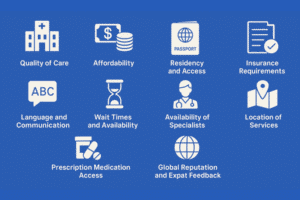When moving abroad, access to quality healthcare is one of the most important considerations for expats. It doesn’t matter whether you’re in poor health or just want to maintain your well-being with routine check-ups, everyone needs a reliable medical system they know they can trust.
This article explores the 13 best countries with top-rated healthcare systems for foreigners and breaks down the key factors to look for when choosing the country you’ll be settling down in:
12 Countries with Best Healthcare for Foreigners
Many expats prioritize access to high-quality healthcare when considering a move abroad.
The following list highlights countries renowned for their exceptional healthcare systems, which provide excellent medical services, advanced facilities, and affordability.
These destinations ensure that foreigners receive outstanding care, making them ideal choices for those seeking peace of mind in their new homes.
1. Mexico
Mexico is a top destination for expats thanks to its combination of affordable care and high-quality private healthcare facilities.
Major cities like Mexico City, Guadalajara, and Mérida boast hospitals with modern equipment, English-speaking doctors, and fast service.
The private sector is often the preferred option due to shorter wait times, while legal residents can also access public systems such as IMSS (employee-based) and INSABI (for those without formal employment).
Key Benefits:
- Low-cost private care with excellent specialists
- Popular destination for medical tourism and retirees
- English-speaking doctors are common in expat areas
2. Costa Rica
Costa Rica provides both universal public healthcare (Caja Costarricense de Seguro Social – Caja) and a robust private sector.
Legal residents are required to contribute to the public system, gaining access to hospitals and clinics nationwide.
The private system is also extremely affordable and offers faster service, often with U.S.-trained professionals.
Key Benefits:
- Affordable and efficient private healthcare
- Residents get access to public system (Caja)
- Known for wellness and medical tourism
3. France
France’s public healthcare system, l’Assurance Maladie, provides broad coverage to residents and is subsidized up to 70–100% for most treatments.
Private supplementary insurance (mutuelle) covers any gaps.
The country offers one of the highest standards of care in the world and is especially renowned for maternity, chronic care, and emergency services.
Key Benefits
- Subsidized public healthcare with global recognition
- High standards in both urban and rural areas
- Supplementary insurance (mutuelle) enhances coverage
4. Germany
Germany’s dual system of statutory public health insurance (GKV) and private insurance (PKV) offers flexibility and comprehensive coverage.
The system is efficient, with an emphasis on preventive care and access to top-tier specialists.
Doctors and facilities maintain consistently high standards, and costs are moderate by European standards.
Key Benefits:
- Efficient and tech-driven system
- High doctor-to-patient ratio
- Expats with residency can access public coverage
5. The Netherlands
The Netherlands operates on a mandatory private health insurance system regulated by the government to ensure fairness and accessibility.
Insurance providers must offer a standardized package, and coverage includes hospital stays, GP visits, maternity, and mental health services.
Care is delivered with a focus on transparency, digital health records, and patient rights.
Key Benefits:
- High-quality care and digital health records
- Compulsory insurance ensures equal access
- Strong focus on mental health and family medicine
6. Singapore
Singapore’s healthcare system is a hybrid of public subsidies and private insurance, delivering world-class medical care with exceptional efficiency and cleanliness.
Hospitals like Mount Elizabeth and Gleneagles are internationally accredited, and the country attracts a large number of medical tourists.
Key Benefits:
- World-class infrastructure and hygiene
- English widely spoken in healthcare settings
- Strong insurance market for expats
7. Spain
Spain’s universal public healthcare system is widely regarded as one of the best in Europe.
Care is free or low-cost for legal residents and includes comprehensive services like specialist visits, surgeries, and preventive care.
The country is also home to a well-developed private system that offers rapid access for those who prefer to supplement their care.
Key Benefits:
- Comprehensive coverage through public system
- Highly rated for chronic and elderly care
- Private options are affordable and widely used
8. Thailand
Thailand is internationally renowned for its private hospitals, which provide world-class treatment at incredibly affordable prices.
Facilities such as Bumrungrad International and Bangkok Hospital offer Western-style care and English-speaking staff.
Though public care is limited for foreigners, private insurance unlocks access to excellent services.
Key Benefits:
- High-quality, low-cost care in private hospitals
- Seamless services with English-speaking staff
- Excellent for elective surgeries and dental work
9. Switzerland
Switzerland delivers outstanding healthcare through a mandatory private insurance model.
While costly, the system ensures high-quality, personalized care with access to state-of-the-art facilities and low patient-to-doctor ratios.
Hospitals are well-equipped, and health services are prompt and efficient.
Key Benefits:
- Premium-quality care and short wait times
- Mandatory health insurance for all residents
- Excellent for complex and specialized treatments
10. Portugal
Portugal offers residents access to its national healthcare system (Serviço Nacional de Saúde – SNS), which covers doctor visits, hospital stays, and surgeries at minimal cost.
Private healthcare is also affordable and widely used to supplement public care.
Portugal ranks high in Europe for health outcomes and quality of life.
Key Benefits:
- Public system accessible to residents
- High expat satisfaction, especially retirees
- Affordable private insurance options
11. Australia
Australia’s healthcare system is built around Medicare, a publicly funded universal healthcare scheme for citizens and permanent residents.
Expats from countries with reciprocal agreements (like the UK and New Zealand) can access care, while others must purchase private insurance.
The system is well-organized, with short wait times for urgent needs and excellent specialist care.
- Efficient public system (Medicare)
- Excellent rural access and emergency care
- Reciprocal agreements with some countries
12. New Zealand
New Zealand provides government-funded healthcare to residents and citizens, with services covering general practice, hospital care, and emergencies.
Though some non-residents may need private insurance, legal expats are well-supported.
The system is simple, community-centered, and responsive.
Key Benefits:
- Public system covers most major needs
- Private sector fills in gaps, especially for elective surgery
- Simple healthcare navigation for expats
10 Factors to Consider When Choosing a Healthcare System
When an expat moves to a foreign country, it is important to search for several essential aspects of the healthcare system to ensure that you and your family have access to high-quality medical care. Here are some critical factors that you should consider:
1. Quality of Care
-
Look for countries with internationally accredited hospitals and high standards of clinical care.
-
Check rankings by WHO, OECD, or The Lancet for healthcare outcomes and patient satisfaction.
2. Affordability
-
Evaluate both out-of-pocket costs and insurance premiums.
-
Consider the cost of prescriptions, consultations, and emergency service. Some countries offer high-quality care at a fraction of the cost.
3. Residency and Access
-
Determine whether legal residency is required to access public healthcare.
-
Some countries, for example Portugal and Spain, grant access upon residency, while others require private insurance for non-citizens.
4. Insurance Requirements
-
Check if private insurance is mandatory and if there’s a public option.
-
Look at whether local insurers cover expats or if international plans are required.
5. Language and Communication
-
Language barriers can affect access and understanding of treatment.
-
If you’re worried about this, look for countries with a high prevalence of English-speaking healthcare professionals or, if you can’t find that, a country with accessible translation services (like Japan).
6. Wait Times and Availability
-
Consider how quickly you can access specialists, surgeries, and emergency services.
-
In some countries, public systems have longer wait times, so private care might be a necessity.
7. Availability of Specialists
-
For chronic conditions or specific needs, like cardiology or oncology, ensure there is access to relevant specialists without long delays.
8. Location of Services
-
Urban areas tend to offer better healthcare infrastructure than rural ones.
-
Take into account your proximity to hospitals, clinics, and pharmacies when choosing a residence in your country of choice.
9. Prescription Medication Access
-
Availability, cost, and regulation of medications vary.
-
Some countries have strict import rules or limited access to certain drugs.
10. Global Reputation and Expat Feedback
-
Research reviews and expat forums for real-world insights.
-
Countries with large expat communities often have expat-oriented healthcare facilities.
How Can Global Citizen Solutions Help You?
Global Citizen Solutions is a boutique migration consultancy firm with years of experience delivering bespoke residence and citizenship by investment solutions for international families. With offices worldwide and an experienced, hands-on team, we have helped hundreds of clients worldwide acquire citizenship, residence visas, or homes while diversifying their portfolios with robust investments.
We guide you from start to finish, taking you beyond your citizenship or residency by investment application.

Frequently Asked Questions About Healthcare for Expats
What country has the best affordable health care?
There are varying opinions and viewpoints on this but Spain and Thailand come out on top with regards to affordability that is combined with quality.
Can you access private hospitals as an expat?
Yes, expats can access private hospitals in most countries, often choosing them for their high-quality services, shorter waiting times, and more personalized care.
What is universal healthcare?
Universal healthcare is a system that provides health services to all individuals and communities without the risk of financial hardship from medical expenses.
In some countries, universal healthcare also gives you access to private hospitals.
Is there a minimum standard of healthcare set out by the World Health Organization?
While the WHO doesn’t necessarily enforce compliance, it sets the global baseline for what quality healthcare should look like and encourages countries to meet or exceed certain benchmarks. These benchmarks can be related to health information systems, service readiness, facility standards and more.
How does healthcare in the US compare to other countries?
The US has the advantage of access to great technology, but it is expensive and insurance-dependent with unequal access.
Which countries offer free healthcare to non-citizens?
Which countries are ideal for medical tourism?
These countries offer a combination of high-quality medical care, affordability, and, access to specialized treatments and advanced technology.
What is the best country for retirees looking for top-notch healthcare?
If you’re looking for the best country to retire in as an American with a top healthcare system, Portugal is your best bet.
















